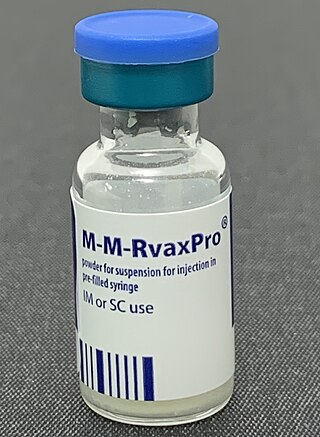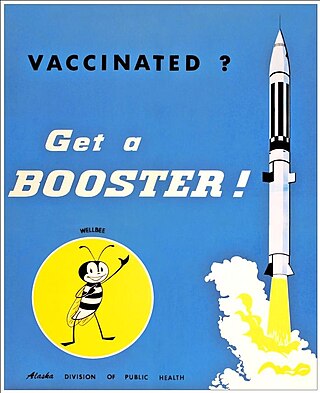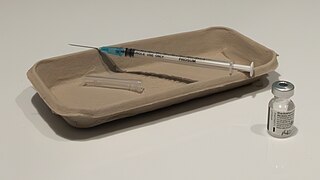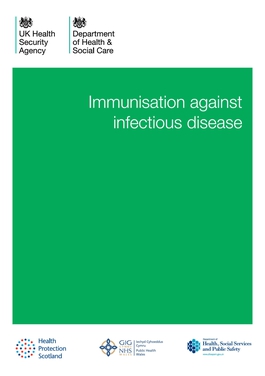Related Research Articles

The MMR vaccine is a vaccine against measles, mumps, and rubella, abbreviated as MMR. The first dose is generally given to children around 9 months to 15 months of age, with a second dose at 15 months to 6 years of age, with at least four weeks between the doses. After two doses, 97% of people are protected against measles, 88% against mumps, and at least 97% against rubella. The vaccine is also recommended for those who do not have evidence of immunity, those with well-controlled HIV/AIDS, and within 72 hours of exposure to measles among those who are incompletely immunized. It is given by injection.

The DPT vaccine or DTP vaccine is a class of combination vaccines to protect against three infectious diseases in humans: diphtheria, pertussis, and tetanus (lockjaw). The vaccine components include diphtheria and tetanus toxoids, and either killed whole cells of the bacterium that causes pertussis or pertussis antigens. The term toxoid refers to vaccines which use an inactivated toxin produced by the pathogen which they are targeted against to generate an immune response. In this way, the toxoid vaccine generates an immune response which is targeted against the toxin which is produced by the pathogen and causes disease, rather than a vaccine which is targeted against the pathogen itself. The whole cells or antigens will be depicted as either "DTwP" or "DTaP", where the lower-case "w" indicates whole-cell inactivated pertussis and the lower-case "a" stands for "acellular". In comparison to alternative vaccine types, such as live attenuated vaccines, the DTP vaccine does not contain any live pathogen, but rather uses inactivated toxoid to generate an immune response; therefore, there is not a risk of use in populations that are immune compromised since there is not any known risk of causing the disease itself. As a result, the DTP vaccine is considered a safe vaccine to use in anyone and it generates a much more targeted immune response specific for the pathogen of interest.
The Medicines and Healthcare products Regulatory Agency (MHRA) is an executive agency of the Department of Health and Social Care in the United Kingdom which is responsible for ensuring that medicines and medical devices work and are acceptably safe.
The Therapeutic Goods Administration (TGA) is the medicine and therapeutic regulatory agency of the Australian Government. As part of the Department of Health and Aged Care, the TGA regulates the safety, quality, efficacy and advertising in Australia of therapeutic goods. Therapeutic goods include goods that are represented to have a therapeutic effect, are included in a class of goods the sole or principal use of which is a therapeutic use, or are otherwise determined to be a therapeutic good through a legislative instrument under the Therapeutic Goods Act 1989. Goods that are therapeutic goods must be entered on the Australian Register of Therapeutic Goods (ARTG), or otherwise be the subject of an exemption, approval or authority by the TGA under the Therapeutic Goods Act 1989, Therapeutic Goods Regulations 1990 or Therapeutic Goods Regulations 2002 before they can be imported, supplied, exported or manufactured in Australia.

A vaccination schedule is a series of vaccinations, including the timing of all doses, which may be either recommended or compulsory, depending on the country of residence. A vaccine is an antigenic preparation used to produce active immunity to a disease, in order to prevent or reduce the effects of infection by any natural or "wild" pathogen. Vaccines go through multiple phases of trials to ensure safety and effectiveness.

A booster dose is an extra administration of a vaccine after an earlier (primer) dose. After initial immunization, a booster provides a re-exposure to the immunizing antigen. It is intended to increase immunity against that antigen back to protective levels after memory against that antigen has declined through time. For example, tetanus shot boosters are often recommended every 10 years, by which point memory cells specific against tetanus lose their function or undergo apoptosis.
A vaccination policy is a health policy adopted in order to prevent the spread of infectious disease. These policies are generally put into place by state or local governments, but may also be set by private facilities, such as workplaces or schools. Many policies have been developed and implemented since vaccines were first made widely available.
National Immunization Technical Advisory Group (NITAG) is an advisory committee composed of multidisciplinary experts responsible for providing information to national governments. This information is used to make evidence-based decisions regarding vaccines and immunization policies. The majority of industrialized countries, as well as some developing countries, have formally established advisory committees to guide their immunization policies, while other countries are working towards establishing such committees.

The National Immunisation Program (NIP) and National Immunisation Program Schedule is the national vaccination schedule for all children and adults in Australia. The program is a joint federal, state and territory government initiative that funds all vaccinations on the schedule for all people eligible for Medicare. It aims to reduce the prevalence of preventable diseases and increase vaccination coverage in the Australian population. NIP-funded vaccines are available through general practices, local council and community health clinics, Aboriginal Community Controlled Health Services and pharmacies. Like all vaccinations, schedule immunisations are not mandatory, although some additional government benefits and early education providers require vaccination or an approved exemption.
Nicola Mary Turner is a New Zealand public health advocate who is a Professor at the University of Auckland and Medical Director of the Immunisation Advisory Centre, an organisation that advises the New Zealand medical profession and the New Zealand Government. She has contributed to advisory committees for the New Zealand Ministry of Health, is a spokesperson for the Child Poverty Action Group and works in general practice. Much of her research and outreach has focused on improving immunisation coverage and closing equity gaps for the national schedule vaccine delivery in New Zealand and she has commented publicly on these issues during COVID-19 in New Zealand.
Helen Aspasia Petousis-Harris is a New Zealand vaccinologist and associate professor in the Department of General Practice and Primary Health Care at the University of Auckland. She has been involved in research related to vaccination in New Zealand since 1998, with her main areas of focus being vaccine safety and effectiveness. Petousis-Harris has had a variety of lead roles in New Zealand and international organisations that focus on vaccination and is a regular media spokesperson in this field, especially during the COVID-19 pandemic.

The COVID-19 vaccination programme in the United Kingdom is an ongoing mass immunisation campaign for coronavirus disease 2019 (COVID-19) during the COVID-19 pandemic in the United Kingdom.

The general COVID-19 vaccination in Australia program began on 22 February 2021 in response to the COVID-19 pandemic, with the goal of vaccinating all willing people in Australia before 2022. Front-line workers and aged care staff and residents had priority for being inoculated, before a gradual phased release to less-vulnerable and lower-risk population groups throughout 2021. The Therapeutic Goods Administration (TGA) approved four vaccines for Australian use in 2021: the Pfizer–BioNTech vaccine on 25 January, the Oxford–AstraZeneca vaccine on 16 February, Janssen vaccine on 25 June and the Moderna vaccine on 9 August. Although approved for use, the Janssen vaccine was not included in the Australian vaccination program as of June 2021.

The COVID-19 vaccination programme in the Republic of Ireland is an ongoing mass immunisation campaign that began on 29 December 2020 in response to the COVID-19 pandemic in the Republic of Ireland. Ireland's vaccination rollout has been praised as one of the most successful rollouts in the world and was ranked number one in the European Union in terms of its percentage of adult population fully vaccinated, and was also ranked number one in the EU for the number of booster vaccines administered.
The National Advisory Committee on Immunization is an advisory body that provides the Government of Canada with medical and scientific advice relating to human immunization.
The Australian Technical Advisory Group on Immunisation (ATAGI) is a technical advisory group of the Australian Government. As part of the Department of Health, ATAGI provides advice to the Minister of Health on the immunisation program of Australia and related matters, including the strength of evidence pertaining to existing, new, and emerging vaccines.
The COVID-19 vaccination campaign in Quebec was a provincial effort to distribute and administer vaccines against COVID-19.

The COVID-19 vaccination in Singapore is an ongoing immunisation campaign against severe acute respiratory syndrome coronavirus 2 (SARS-CoV-2), the virus that causes coronavirus disease 2019 (COVID-19), in response to the ongoing pandemic in the country. Singapore has a very high vaccination rate, with more than 92% of its total population having completed their vaccination regimen.
Anthony Harnden is Professor of Primary Care, General Practitioner and Fellow of St Hugh's College at Oxford University. He is also director of graduate studies for the Nuffield Department of Primary Care Health Sciences and sits on the General Medical Council, which is responsible for the regulation of all UK doctors and UK medical schools. He is also editorial advisor for the British Medical Journal. Harnden "has been the General Practitioner member of the Joint Committee of Vaccination and Immunisation (JCVI) since 2006 and Deputy Chairman since 2015."

Immunisation against infectious disease, popularly known as The Green Book, provides information on vaccines for vaccine-preventable diseases. It acts as a guide to the UK's vaccination schedule for health professionals and health departments that give vaccines in the United Kingdom.
References
- 1 2 3 4 5 6 "Joint Committee on Vaccination and Immunisation: Code of Practice" (PDF). GOV.UK. Joint Committee on Vaccination and Immunisation. June 2013. Retrieved 6 October 2020.
- 1 2 The Health Protection (Vaccination) Regulations 2009 (Regulations 38). Secretary of State. 2009.
- ↑ The National Health Service (Standing Advisory Committees) Order 1981 (Order 597). Secretary of State for Social Services. 1981.
- ↑ "Official Report - Public Petitions Committee". 21st Meeting 2015, Session 4. Pàrlamaid na h-Alba. 8 December 2015.
- ↑ Files, Angus. "New Scottish Vaccine and Immunisation Advisory Committee" (PDF). Public Petition No. PE01584. Archived from the original (PDF) on 3 July 2021. Retrieved 3 April 2021.
- ↑ Health and Social Care Act 2012: Explanatory Notes (Explanatory Notes). 2021.
- 1 2 3 "Joint Committee on Vaccination and Immunisation". Gov.UK. Retrieved 26 June 2018.
- ↑ Wood, Poppy (11 November 2020). "Coronavirus: Phase one vaccine rollout will protect '99 per cent' of UK's at-risk population". CityAM. Retrieved 27 February 2021.
- 1 2 "Winter Covid vaccines axed for under-65s". BBC News. 8 August 2023. Retrieved 9 August 2023.
- ↑ "Supplement 1: Birthday Honours List – United Kingdom". The London Gazette . No. 60534. 15 June 2013. p. 1. Retrieved 24 September 2021.
- ↑ E Miller; N Andrews; J Stowe; A Grant; P Waight; B Taylor (15 March 2007). "Risks of Convulsion and Aseptic Meningitis following Measles-Mumps-Rubella Vaccination in the United Kingdom". American Journal of Epidemiology. 165 (6): 704–9. doi: 10.1093/aje/kwk045 . PMID 17204517.
- ↑ "UK withdraws two leading MMR vaccines". 20 September 1992. Retrieved 24 September 2021.
- ↑ Duckworth, Lorna (5 January 2014). "Health Authorities Block Import Of Unlicensed Single Mumps Vaccine" . The Independent . Archived from the original on 14 June 2022. Retrieved 24 September 2021.
- ↑ "Comments on "Measles, mumps, rubella vaccine: Through a glass darkly" by Wakefield and Montgomery". January 2001. Archived from the original on 14 July 2007. Retrieved 11 February 2008.
- ↑ Deer B (5 January 2011). "How the case against the MMR vaccine was fixed". BMJ. 342: c5347. doi:10.1136/bmj.c5347. PMID 21209059.
- ↑ "Meeting minutes". JCVI. 2 November 2001. Archived from the original on 9 June 2007.
- ↑ "Covid-19: Most vulnerable 'could get vaccine by Christmas'". BBC News. 17 October 2020. Retrieved 21 December 2020.
- ↑ "Priority groups for coronavirus (COVID-19) vaccination: advice from the JCVI". GOV.UK. Department of Health and Social Care. 2 December 2020. Retrieved 21 December 2020.
- ↑ "Priority groups for coronavirus (COVID-19) vaccination: advice from the JCVI". GOV.UK. 30 December 2020. Retrieved 31 December 2020.
- ↑ Roberts, Lizzie; Knapton, Sarah; Riley-Smith, Ben (6 April 2021). "Halt rollout for younger people until safety of AstraZeneca vaccine 'certain', says adviser" . The Telegraph. Archived from the original on 12 January 2022.
- ↑ Knapton, Sarah (7 April 2021). "The press conference nobody wanted to give - what we learnt from the blood clot briefing" . Telegraph Media Group Limited. Archived from the original on 12 January 2022.
- ↑ Diver, Tony (7 April 2021). "Under 30s to be offered alternative to AstraZeneca vaccine after 79 blood clot cases" . Telegraph Media Group Limited. Archived from the original on 12 January 2022.
- ↑ "JCVI final statement on phase 2 of the COVID-19 vaccination programme". GOV.UK. 13 April 2021. Retrieved 14 April 2021.
- ↑ "JCVI advises on COVID-19 vaccine for people aged under 40". GOV.UK. Public Health England. 7 May 2021. Retrieved 8 May 2021.
- ↑ "Joint Committee on Vaccination and Immunisation (JCVI) statement on COVID-19 vaccinations in 2022". GOV.UK. 21 February 2022. Retrieved 19 April 2022.
- ↑ "JCVI provides interim advice on an autumn COVID-19 booster programme". GOV.UK. UKHSA. 19 May 2022. Retrieved 20 May 2022.
- ↑ "Over 50s to be offered COVID-19 booster and flu jab this autumn". GOV.UK. UK Health Security Agency. 15 July 2022. Retrieved 16 July 2022.
- ↑ "JCVI publishes advice on COVID-19 vaccines for autumn booster programme". GOV.UK. UK Health Security Agency. 15 August 2022. Retrieved 16 August 2022.
- ↑ "JCVI advises use of additional bivalent vaccine for autumn booster campaign". GOV.UK. UK Health Security Agency. 3 September 2022. Retrieved 4 September 2022.
- ↑ "JCVI statement on spring 2023 COVID-19 vaccinations, 22 February 2023". GOV.UK. Department of Health & Social Care. 7 March 2023. Retrieved 11 March 2023.
- ↑ "JCVI statement on COVID-19 vaccination in spring 2024 and considerations on future COVID-19 vaccination". GOV.UK. 4 December 2023. Retrieved 8 February 2024.
- ↑ "JCVI statement on the COVID-19 vaccination programme for autumn 2024, 8 April 2024". GOV.UK. Department of Health & Social Care. 2 August 2024. Retrieved 4 August 2024.
- ↑ "Government accepts advice on 2024 autumn COVID-19 vaccine programme". GOV.UK. 2 August 2024. Retrieved 4 August 2024.
- ↑ "Advice accepted on spring 2025 COVID-19 vaccination programme". GOV.UK. 12 December 2024. Retrieved 13 December 2024.
- ↑ Gillett, Francesca (4 August 2021). "Covid: Jabs for 16 and 17-year-olds to start within weeks". BBC News. Retrieved 5 August 2021.
- ↑ "JCVI statement, August 2021: COVID-19 vaccination of children and young people aged 12 to 17 years". GOV.UK. 4 August 2021. Retrieved 5 August 2021.
- ↑ "JCVI statement on COVID-19 vaccination of children and young people: 22 December 2021". GOV.UK. Retrieved 24 January 2022.
- ↑ "COVID-19 vaccination: a guide for eligible children and young people aged 12 to 17 (version 3)". GOV.UK. Retrieved 24 January 2022.
- ↑ "JCVI statement on vaccination of children aged 5 to 11 years old". GOV.UK. 16 February 2022. Retrieved 16 February 2022.
- ↑ Morris, Sophie (16 February 2022). "COVID-19: All children aged 5-11 in UK will be offered coronavirus vaccine as England and Northern Ireland become latest nations to confirm plan". Sky News. Retrieved 16 February 2022.
- ↑ "Expert comments: UK JCVI interim advice on whether children and young people aged 12-17 years should be offered the COVID-19 vaccine". COVID-19 Vaccine Media Hub. 29 July 2021. Retrieved 5 August 2021.